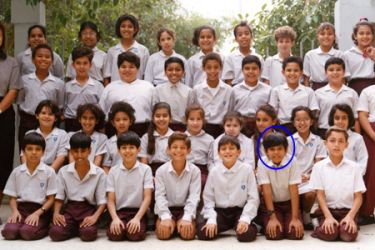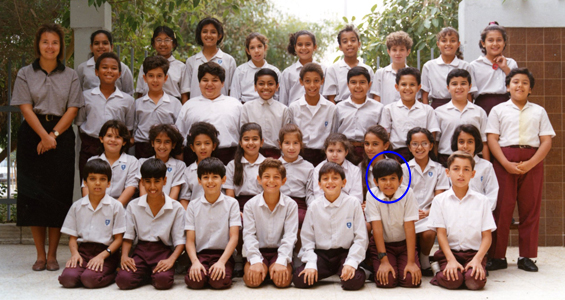
Rocky: ‘I saw tanks from our house’
For Rocky the most striking thing was the eerie silence of Kuwait’s deserted streets.
 |
On August 2, 1990, the Iraqi army invaded the small emirate of Kuwait, which Saddam Hussein, Iraq’s president, had declared his 19th province.
The Gulf war lasted a little over six months yet the memory of the conflict remains strong, not least in the minds of the children of that war.
At the end of the school year of 1990, students at an international school in Kuwait said their final farewells as they headed off for the summer holidays.
Twenty years on, Al Jazeera follows a group of classmates who were separated during the war as they organise a reunion and try to find out what happened to their classmates and their school during and after the war.
Al Jazeera’s Nashwa Nasreldin was one of those students. She spoke to former classmate Rakesh Gaur, nicknamed Rocky, who is a British Indian living in the UK where he works as a civil engineer.
During the invasion, he was alone in Kuwait with his mother and one of his sisters. His father and other sister were in India for the summer.
After six weeks, Rocky’s mother managed to plan their escape, negotiating seats for them on a British evacuation flight back to the UK where they were reunited with the rest of their family.
Al Jazeera: So that summer you and your mum were in Kuwait. Do you remember what you were doing in the days before the invasion?
Rocky: I don’t remember anything particular in the days just before the invasion. It was a regular summer holiday playing with friends a lot in the complex. Everyone was meeting up and enjoying their days free of school.
I do distinctly remember the day of the invasion where I woke up early in the morning to take my dog for a walk. It must have been eight o’clock in the morning and there was an area outside the complex where I used to take him in the morning for his walk.
When I came home and I put the television on I saw news that Iraq had invaded Kuwait.
Probably then, within a matter of maybe an-hour-and-a-half or two hours, we saw tanks rolling down the motorway that you could see from our sitting room window.
At that time it was quite scary and I was uncertain as to what was going on and what to do. Lots of people from our complex were driving out to Saudi Arabia, so they were getting into their cars and fleeing.
But we decided to stay and see how the situation was going to develop. There was a lot of uncertainty and it was quite a scary time.
Did you have any idea at the time what the implications would be?
It was just getting on day-by-day so there was not really any idea about how long we would be in this situation. Would it be a week? Would it be a month? Would it be a year? I was just taking things day-by day and getting on with whatever had to be done.
I remember that the Iraqi soldiers started rounding up American and British men, and lots of our family friends in the complex were British or American so I remember they had to go into hiding. They wouldn’t go out. They would make sure their curtains were drawn and they would be very careful about answering the doors. I think they had some sort of secret knock developed.
Did you ever go outside the complex?
I do remember going out once or twice with my mum and another family friend who had a car. I think we may have once gone to the bank to try to withdraw money because if we were going to leave we thought we would try and sort of salvage anything from any of the accounts. I don’t know if there was much point in that but it was one of those things we did at the time.
I remember also that we were free to travel because we had Indian passports. I remember going through some checkpoints of Iraqi soldiers and showing our passports there. They were absolutely fine with that and let us go through.
Do you remember things seeming at all different when you did go out, when you got to the checkpoint?
I remember things being very, very quiet. Hardly any traffic on the roads, hardly any people around. Even in the bank I remember it being very, very deserted. I don’t particularly remember seeing many damaged buildings en route. I remember seeing piles of rubble and metal and pieces of strewn tanks and things around.
The most notable thing was the eeriness of the streets being very empty because I was used to it being very bustling and lots of traffic all the time and lots of people around. That was probably the most distinct kind of feeling that it was very, very eerie and quiet.
Do you remember how and when you decided to leave the country and what happened?
I am not sure how we found out – maybe through BBC World Service – but mum got to know that the British embassy was trying to organise evacuation flights for women and children. My parents had residential status in the UK and my older sister had a British passport. I remember my mum managing to contact the British ambassador in Kuwait and asking whether it would be okay if we managed to get out on one of the evacuation flights.
He said yes, absolutely he would arrange that and get us word about where the meeting places were.
I remember staying at the house of a family friend the night before and then there was just one suitcase for me and one suitcase for my sister, and my mum with one suitcase.
I think the meeting point was a big car park of a shopping store. I remember the shopping store looked quite destroyed and quite a shadow of a building.
We were flown first from Kuwait to Baghdad. There was a stopover in Baghdad and then got flown out on the flight that was scheduled to go to London and then to the US and then to Canada. It was only women and children.
I remember sleeping the whole way through the flight. There must have been some sort of adrenalin [come down] and [a] complete [sense] of not having to be on guard all the time – it was just relaxation.
My mum remembers that flight being absolutely silent. She said that no one said a word. There was no sound until we touched down at our first destination in London where you could sense the feeling of relief.
Like I said, everyone was living day by day, doing what we had to do. That was the first point where people were actually relieved that they were out. The situation has finally changed – the sort of disbelief that finally it was all over.
How did you get in touch with your father?
We phoned him once we got to London. So that was the first opportunity we had to contact him. They provided telephones at the airport for everyone who wanted to contact anyone anywhere in the world.
What happened when you saw him?
That was very emotional for my mum. It was strange. The doorbell rang, and then all of a sudden my dad and my sister were there. For me, I don’t remember being completely overcome emotionally or anything. I think the thing is that my mum was very emotional so at that time I was probably reacting to that more than anything else.
How was life in the UK?
We ended up staying with family friends for around a month. Luckily, because my father went to university in London and had lived here for a portion of his life – he knew London fairly well. We moved into a rented house in the area where my father used to live when he was a student.
I remember being quite happy because I missed about six months of school. So even though I missed my friends at school, it was quite nice to have [such a] large amount of summer holiday.
I remember being quite excited about going to a new school [around the] time my parents enrolled me in a school in around November or December of that year.
That was quite an interesting experience because it was a very different schooling experience to what I was used to in Kuwait. In Kuwait it was all very multinational – lots of expats, lots of people from all over the Arab world. Whereas the school I went to here was very much a local state school. I think I and one other person were the only non-whites there.